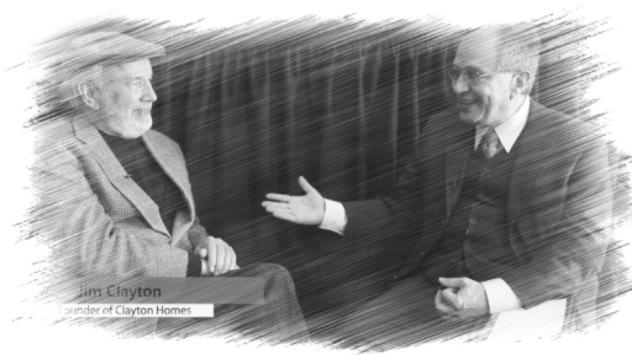"Hurry, hurry, hurry, bombs in the burry!" is a colloquial expression that conveys a sense of haste or urgency. A burry is a patch of burrs, or a bitter cold climate like northern Minnesota's in winter. It was MHC and RE industry legend, Sam Zell, who told some 200 MH Industry pros that we needed a greater sense of urgency, and that among the risks of 'cheap money' and QEs was that it created a diminished sense of urgency.
There are indeed times when urgency is called for – and when bombs are falling, or the cold is bitter – could certainly be among them.
But in business, when you are interacting on a big ticket item – the sale of a manufactured home, for example – one must read the signals and circumstances.
Indeed, sometimes urgency is exactly what is called for to make a deal happen. But urgency with an analytical buyer who is nowhere near the fence – much less on it – can cost you a good customer.
The successful fisherman doesn't try to set the hook before the fish has taken the bait! Fishing takes patience and discernment, when to act in haste and when to be patient.
Customers often fear a decision. There are many reasons that may be so. Once you understand them, and their circumstances, you can better help them in their buying process.
Lifetime Value
Jay Hamilton expressed a truism last year, too many in our industry are stuck in short term thinking mode. They fail to invest in proper marketing and training. There are costs to that which are far greater than may first meet the eye.
proper marketing and training. There are costs to that which are far greater than may first meet the eye.
Harvard University did a study on the Lifetime Value of Customers, and proposed a formula to calculate that value. Let's keep it simple today and say, that a happy customer is more likely to come back and send their family, friends and co-workers.
Jim Clayton in our upcoming follow up on our video interview speaks about investing and developing people. Around 80, he is still doing that today! Do you think the $1.7 billion dollar payday he made when Clayton Homes sold made investing in people and systems worthwhile?
Answer, you bet.
If you meet someone who thinks they are too smart to learn from others, remind them that billionaire Jim Clayton is still learning, still investing in people and processes that yield satisfied customers. Jim sat near the front of the room when Sam Zell spoke.
Check out part one of Jim Clayton's video. And watch for part two coming in June as a featured article. ABL = Always Be Learning!
Marketing and Training
All of this relates to issues that connect with marketing and sales training.
Pat Curran, a veteran who has spent decades in insurance and finance in MH and has seen dozens of sales operations, sent this in which makes a great point that dovetails with Jay Hamilton's.
.png)
We must not set our sights too low on marketing.
Should an MHCommunity or MHRetailer be surprised that the 'get me done' customer arrives when many essentially advertise for that profile of buyer?
And when you do attract a good credit customer, are you surprised that you don't close more of them if your people are not prepared to deal with that better qualified buyer?
There are times when urgency is needed, and there are others when patience should prevail. How to identify and know the difference is a matter of training and experience!
Sam Zell's organization and Jim Clayton's both share this success key: they make the investment in developing the right people and processes. The payoff is long term success!
If you are the smallest mom and pop in the industry and have no budget to spare, at a bare minimum, you must require your people to read and study to learn and grow. If that describes you, and you are reading this, great, but then make sure your people read this 'and get it' too!
In the ideal, if you have the right kind of people and have a budget, you must invest in them!
If you have the wrong kind of people, why is that and how do you plan to solve it?
Tim Connor asks the question, how much are your lost sales costing you? We could add to that, what does it cost you to market to the least credit worthy audience?
The lowest hanging fruit is likely already on the ground, and may have worms. The best, juiciest fruit may take more effort to get, but once you do, isn't it worth it?
Everyone needs a good, decent place to live, so don't misunderstand the point. "Selling up" doesn't cost you the lowest rung on the.jpg) financial ladder. Those 'damaged credit' customers will come your way anyway. Remember, over 58% of the population has a credit score 700 or above, while only 15% have one under 600.
financial ladder. Those 'damaged credit' customers will come your way anyway. Remember, over 58% of the population has a credit score 700 or above, while only 15% have one under 600.
Marketing and selling up, along with investing in the processes that make that a successful reality, that's where the long term value is. Who says? The experts, leaders and legends in our field!
Treating all customers – and your staff – the way you'd want to be treated is how you maximize the lifetime value of everyone you meet.
If you want the better qualified customer, learn to how to market to and attract them, and then learn how to successfully interact with them to earn their business.
If you have good people, invest in them directly via training and indirectly via providing them the tools they need to be successful..
You'll be glad you did. Investing in your people and business is the safest bet you can possibly make, and the one you have the most ability to influence and control. ##
 L. A. 'Tony' Kovach ManufacturedHomeLivingNews.com | MHProNews.com | Business and Public Marketing & Ads: B2B | B2C Websites, Contract Marketing & Sales Training, Consulting, Speaking: MHC-MD.com | LATonyKovach.com | Office 863-213-4090 Connect on LinkedIN: http://www.linkedin.com/in/latonykovach
L. A. 'Tony' Kovach ManufacturedHomeLivingNews.com | MHProNews.com | Business and Public Marketing & Ads: B2B | B2C Websites, Contract Marketing & Sales Training, Consulting, Speaking: MHC-MD.com | LATonyKovach.com | Office 863-213-4090 Connect on LinkedIN: http://www.linkedin.com/in/latonykovach
